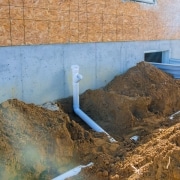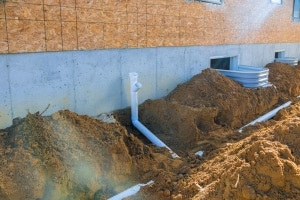Why Water Drainage is Important
Water damage is one of the most common high-cost repairs that homeowners face. And there are so many ways that it can happen.
You may know about the risks of gaps and holes in and around the exterior of the house. A leaky roof or a window with improper insulation can allow water to get inside, causing wood rot and mold growth.
People are always concerned about their water, sewer, and septic systems too. If pipes burst or toilets overflow, the cost to dry out and replace ruined materials can be astronomical.
But there is another culprit to water damage that isn’t discussed as much as it should be – water drainage! When water flow doesn’t go where it should, the results will always be bad news for your property.
So what do you need to look out for?
There are multiple areas of a home where drainage problems can lead to a watery disaster. These include the:
- Utility Room
- Roof and Gutters
- Ground Surface
Let’s explore each of these home inspection focuses in more detail.
Utility Room Drainage
If your hot water heater, HVAC system, or washing machine malfunctions, there is a really good chance that water will be everywhere. That’s why utility rooms and laundry rooms need excellent drainage. A part of the home inspector’s job is to check where a wave of liquid would travel within these locations of your home.
If it were to collect around your walls, it would cause serious water damage. But if the floors are sloped properly and that decline leads to a drain, you’re in luck! Your appliance repair will be an isolated financial cost. That’s the ideal situation every homeowner should aim for.
An inspector doesn’t need to pour water on your floor to know if your utility room has sufficient drainage. It’s easy to test if the floor slopes with a leveling staff.
Roof and Gutter Drainage
If water pools on the top of your house, it has a high chance of seeping inside. Most housing materials are water-resistant, not waterproof. They are designed to keep moisture away in most circumstances.
But if the moisture persists in one place, the water will likely get inside. A well-built home in good condition will direct water off of and away from the sides of the building.
A roof should be sloped enough to allow water to runoff from it with ease. If pooling takes place, the water has a high chance of seeping inside.
A professional roofing contractor will install your flashing in a way that hangs slightly over doors and windows to guide rainwater away from these joints. If the flashing is too short, the frames will be exposed to moisture regularly and need to be replaced more often.
The eaves and gutters of a home are there to also lead rain away from the sides of the property, especially the foundation. While the eaves keep water far away from the exterior walls, the gutters take further action by offering a pathway for the rain to drain far away from the foundation.
A home inspector will check the eaves for signs of leaks and inspect the gutters’ integrity. They will also measure how far away from the home the gutters drain. Should they find an issue, water damage may be present within the walls or at the foundation level.
Ground Surface Drainage
Water should never get close to the foundation of your residence. Just like the floor of your utility room, the ground around your home should direct water away from your walls to prevent moisture penetration.
As recommended by the International Association of Certified Home Inspectors (InterNACHI), a home’s ground surface should be slanted at an angle so that the ground 10 feet away from the property is six inches lower than the ground immediately next to the home’s foundation.
The amount is so small that it’s difficult to see with the naked eye. Once again, a handy leveling staff can help.
Home Inspection Water Drainage Concerns in Tampa
If you are concerned about the structural integrity of a house, hire an expert who has the skills and understanding to detect drainage problems before they cause thousands of dollars in damages. We’ll do a complete inspection of the house from top to bottom and present you with a detailed report.
Divinity Inspection Services employs inspectors that are well qualified and have previous contracting experience. They are not only knowledgeable about how to evaluate a home but also about how to construct one effectively.



